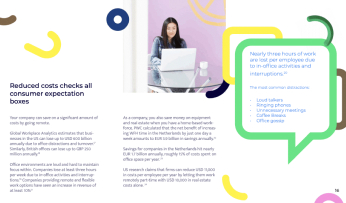Done right, working from home gives you space for important things like exercise, sleep, healthy eating, and time with the people you care about.
If mismanaged, remote work can leave you isolated and with a poorly arranged workspace to boot.
Forming a healthy relationship to working from home is more difficult in customer support. Often, you’re sat at your desk with a headset on for eight-hour stretches.
But it doesn’t have to be that way. It’s time you looked out for yourself as much as your customers.
How to stay healthy as a remote customer support agent
Working from home is massively rewarding, but only if you know how to approach it.
Taking “one more call” before lunch might not be the best thing you can do for your well-being. And maybe “one last ticket” before your shift ends isn’t worth it.
So, how can you make the most of your home-working environment as a customer support rep?
1. Set consistent bedtimes for a good night’s rest
Keeping a consistent sleep schedule is vital to your mental and physical health. You owe it to your body and your customers to get enough rest.
⏰ Fix your sleep schedule by setting yourself designated bedtimes and daily alarms.
Sticking to the same bedtimes improves your sleep quality. And if you’ve slept well, you’ll be able to handle more tickets through fresher eyes.
Pro-tip: Consider a 20-minute power nap if you can fit it in.
2. Take breaks whenever you can
Providing customer support from home makes it easy to lose track of time. As the pandemic showed us, life can become one dull blur without a break.
🗓️ Schedule designated break times throughout the day — outside of lunch.
Taking breaks boosts your energy levels and focus. It helps free your mind and overcome mental blocks.
Whether your eyes are getting tired, you need to stretch, or you’re thirstier than you realised, take a breather, then come back to it.
3. Schedule your workday so it works for you
Traditional workdays involve a formula of home, commute, work, lunch, work, commute, home. Working from home, those lines vanish altogether.
You have to be responsible for managing your own time as well as you manage customer tickets. For that, it helps to structure your days.
📅 Create a daily schedule of working hours, lunch, and breaks and stick to it.
Work can creep up on you.
Before you realise it, you’re checking tickets in your downtime. Before you know it, you’re frazzled, stressed, and unproductive.
Creating a disciplined schedule and following it helps you manage your time.
4. Remember to eat lunch and snacks
Forget your lunch? You’re not alone. A survey by Liberty Games concluded that 41% of British people skip lunch when working from home.
Skipping lunch makes it easier to overeat once you realise how hungry you are, leading to fatigue and career burnout. (And yes, customers can tell.)
🥪 Prepare your meals in advance. Or, if you can’t find time for that, put thought into quick and healthy options you can whip together.
Putting aside an hour in the middle of the day is good for you. Food improves your working day and refreshes you, helping you overcome afternoon slumps.
Pro-tip: Set aside time to snack, but keep it to fruit, nuts, and vegetables.
5. Exercise as much as you can
Without a daily commute, you have more time for exercise. But if you slip into a work-work-work mind-frame, you likely won’t take advantage of the opportunity.
Aside from keeping you healthy in body, exercise is medically proven to improve your mood.
🏃 Set timers to get up and walk around a couple of minutes every hour. And set aside larger blocks of time to do exercise you enjoy (be it yoga in the living room or Tai Chi in the park).
Taking brisk walks boosts your mental and physical health. Whether you’re grabbing coffee or taking your dog for a walk, getting out there helps.
Try setting timers to remind you to move around every hour — and don’t forget to stretch.
When you’re doing a customer support job, you miss out on the movement of a daily commute. Make sure you use remote work as an opportunity to make more time to move, not less.
Pro-tip: Put the headset down now and then.
6. Take note of your vacation days
Whether working in a call centre or at home, vacation days disappear.
Maybe you “saved them for a rainy day” or forgot to schedule them into your calendar. Just make sure you take them.
Vacations are necessary for good mental health. So, dust off your atlas and dream up where you’ll go.
🏖️ Use your vacation days. They’re there for a reason.
7. Stop thinking about work outside of working hours
We’re always connected, and most people are on their phones 24/7.
Working from home, it’s too easy to “just” check an email or “just” respond to a message. Especially between customer support inquiries.
A survey by HRM Guide found that 93% of people continue to work after hours, averaging three hours and 31 minutes every week.
That’s an extra 23 working days every year.
Although this survey was conducted in 2012, digital technology is distracting as many people ten years on.
🕒 Don’t work after hours. Don’t touch your work email or communication apps unless on the clock.
Flexible working is one of the best parts of the modern era. But it can also be dangerous if you don’t monitor your hours.
Working too much can lead to burnout.
The National Bureau of Economic Research conducted a study revealing that, since the pandemic made WFH “the norm”, workdays became, on average, 48 minutes longer.
Ready to work?
We love making customer service a remote-first job. We love the freedom, possibilities, and opportunities it provides people across the world.
But if you’re not taking care of yourself, you’re not making the most of working from home. You need to eat well, sleep well, and breathe fresh air.
Ironically, some of the benefits of working from home are also those most easily forgotten.
If done right, remote customer service can open up a world of freedom. A world in which you’re neither tethered to a cubicle nor stuck on crowded commutes.
Use your imagination, make a plan, and stick to it.
We want you to have a remote-first lifestyle that empowers and inspires you and every other customer support agent.
Because nobody should feel tied to a job.





